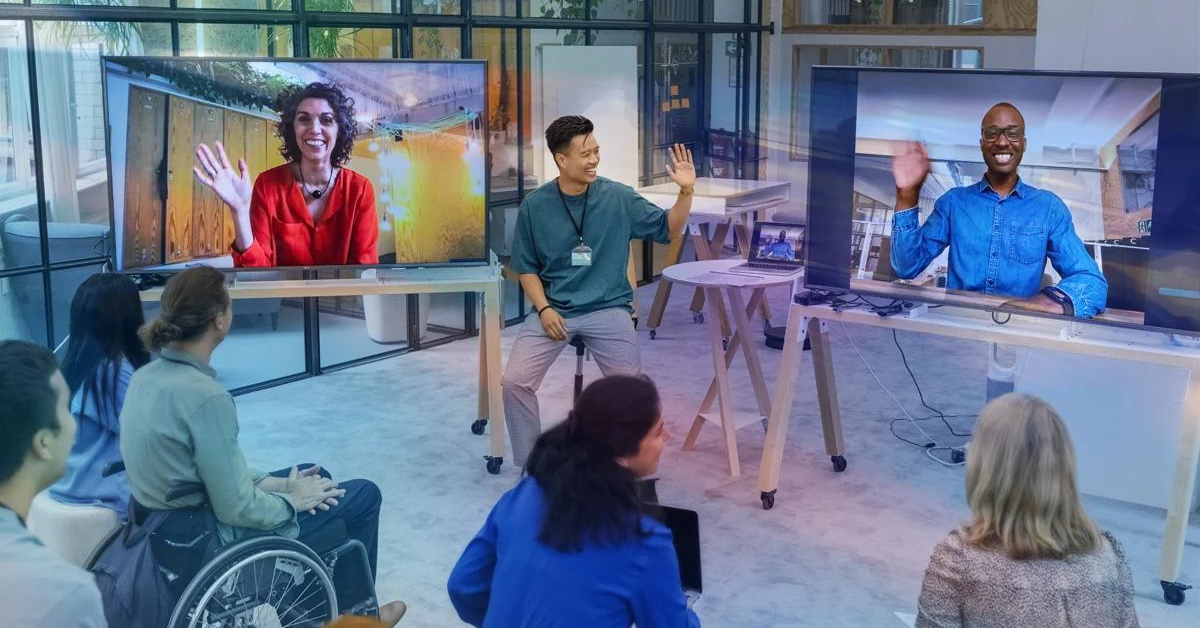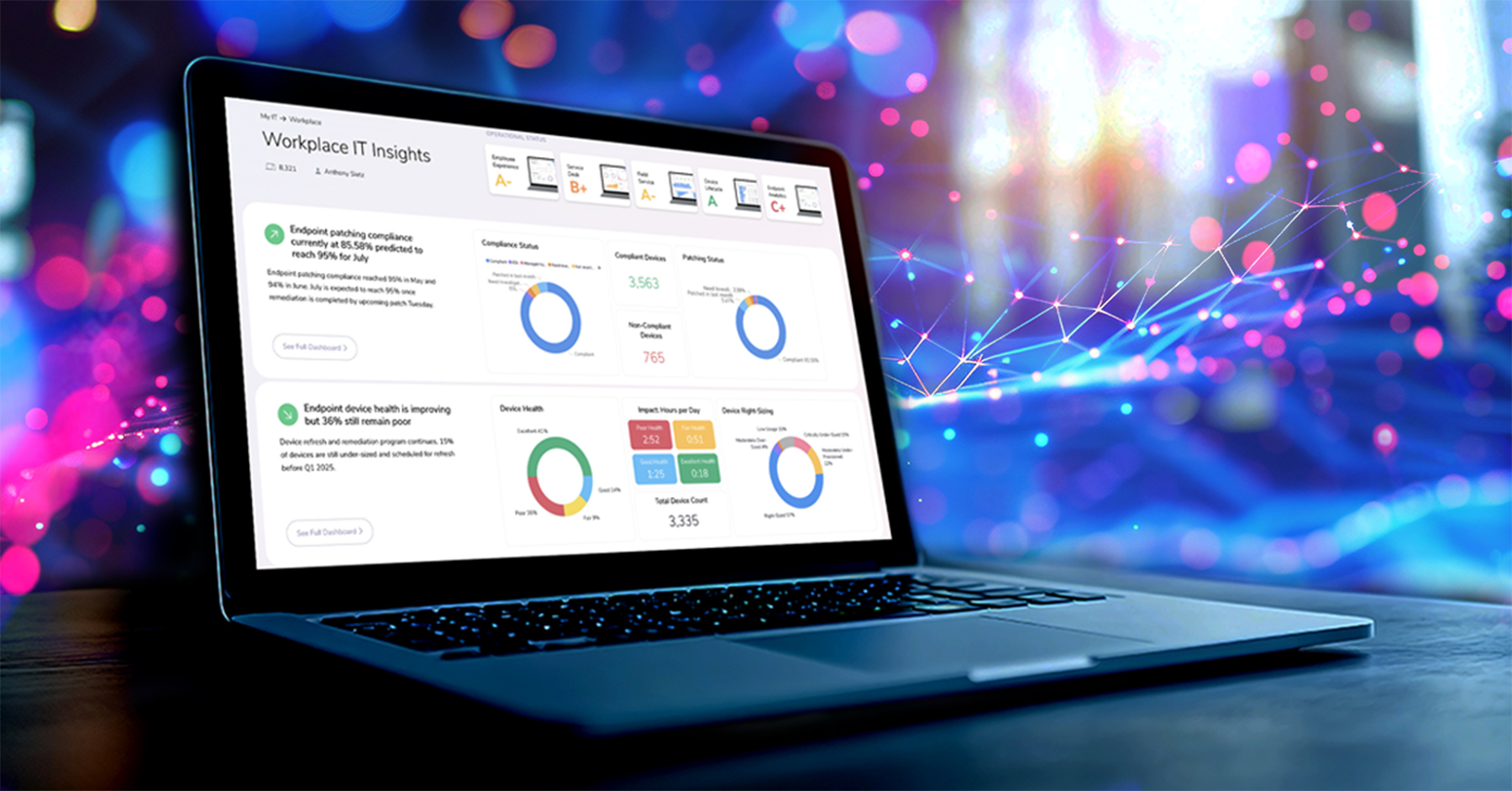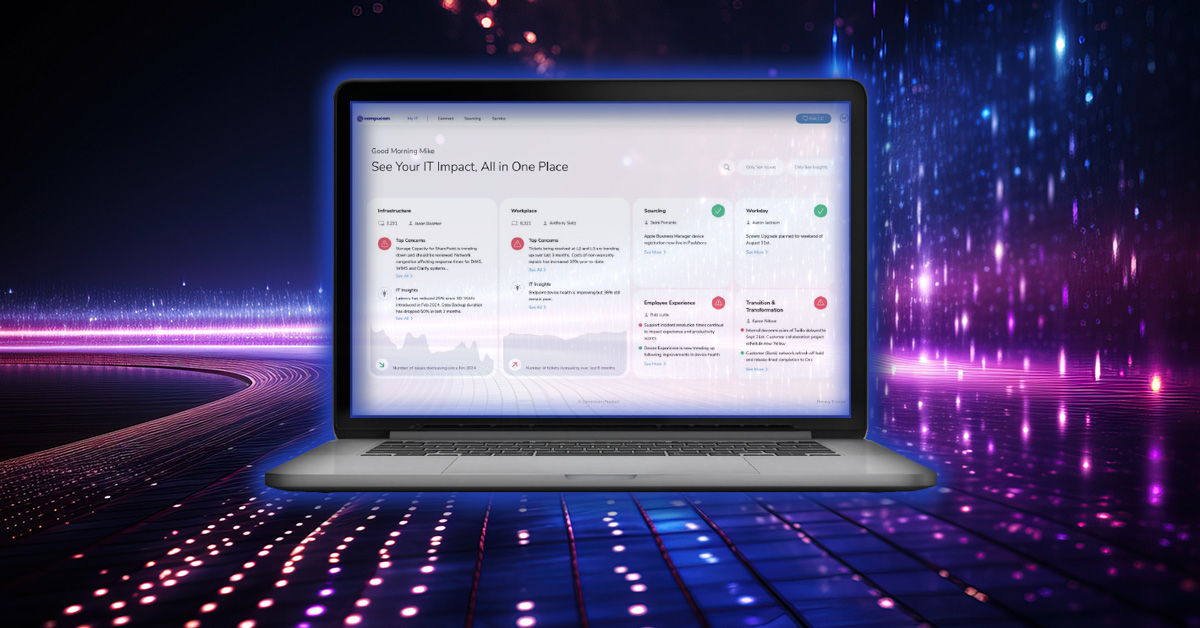- Managed Infrastructure and Cloud Services
- Advanced Technology


Marketing Compucom
How Employers Will Support Flexible Hybrid Work in 2023
Hybrid. Flex. Remote-friendly. Whatever you call it, study after study shows that employees prefer flexible work.
With reports piling up about the positive impact on productivity, staffing and overall employee happiness, C-suite leaders and tech managers are now embracing more flexible “return to office” plans.
How will that trend impact the employee experience? For the better, if companies put the right tech and support in place.
In this multi-part blog series, we’re exploring the most common digital workplace approaches we see and support today, across a variety of industries.
Today we’ll look at what we call the “corporate flex” hybrid model, which 8 in 10 execs believe will be the default model by 2024.
The “Corporate Flex” Hybrid Employee Experience
What’s the Experience
Employees spend some days working remotely and some time at the office, with schedules usually determined by corporate policy. Distributed tech moves between locations and may include employees’ personal devices in the mix.
A busy exec could lead an important forum on Monday, pop to virtual and in-person meetings the rest of the week, then recharge with a Work From Home (WFH) Friday — toting a company laptop and personal smartphone the whole way.
At the office, new tools help employees book workstations, meeting rooms or other resources in advance, so they can make the most of their time. Employers are also investing in new hybrid conferencing concepts to put virtual attendees on the same level as in-person attendees.
The whole point is to empower people to work in ways that are most effective and productive for them and for their teams.
Why Employees Love It
Flexibility = a better work/life balance. In a Gallup poll released in September 2022, employees said flex working arrangements greatly improved their personal well-being and work/life balance, leading to higher productivity and less work turnover and burnout.
“The whole point is to empower people to work in ways that are most effective and productive for them and for their teams.”
See It in Action
Two days in the office, or three? Hybrid employers like Cisco have found success by giving individuals or teams the power to decide “how Cisco works.”
Tech Challenge
As flexible and hybrid work becomes the norm, employers and tech teams must be able to deliver “experience parity” across locations. What systems need to change to ensure that remote workers and people in the office are on equal footing?
Support Strategy
This should be flexible, too. Enterprises should offer options to suit varied IT personas, from AI-powered chat all the way up to white-glove service.
Questions For the IT team
- Can employees safely access their apps and data from anywhere? Is it easy to work together across locations?
- Are offices, conference rooms and other shared spaces prepared for a return to the office? What devices and infrastructure need updates?
- Could the corporate network benefit from Cisco Identity Services Engine?
- How will you deliver a consistently great IT experience —any time, any place, on any device?
Curious about how to support a flexible hybrid experience? We can help.
At Compucom, we offer a full suite of end-to-end managed IT services, designed to support distributed technology while improving the overall employee experience. Book a meeting to learn how we bring employee experience to the center of your digital workplace.
- Learn more about remote work
- Learn more about on-site work
- Find out why bad tech is bad for business
RecenT

9 Ways Strategic IT Staffing Empowers Organizations

Case Studies: Asset Intelligence and Endpoint Compliance Made Easy

AI and the Enterprise: The Future of IT Management

Exploring the Opportunities and Obstacles of AI in the Enterprise

One Dashboard to Rule Them All: Strategic IT Excellence with Full Lifecycle Observability

Transforming IT Operations with Full Lifecycle Observability: How Compucom’s FLO Framework Redefines Data-Driven Efficiency
TOPICS
Enterprises “Flex” Their Muscles
- Managed Infrastructure and Cloud Services
- Advanced Technology

Marketing Compucom
How Employers Will Support Flexible Hybrid Work in 2023
Hybrid. Flex. Remote-friendly. Whatever you call it, study after study shows that employees prefer flexible work.
With reports piling up about the positive impact on productivity, staffing and overall employee happiness, C-suite leaders and tech managers are now embracing more flexible “return to office” plans.
How will that trend impact the employee experience? For the better, if companies put the right tech and support in place.
In this multi-part blog series, we’re exploring the most common digital workplace approaches we see and support today, across a variety of industries.
Today we’ll look at what we call the “corporate flex” hybrid model, which 8 in 10 execs believe will be the default model by 2024.
The “Corporate Flex” Hybrid Employee Experience
What’s the Experience
Employees spend some days working remotely and some time at the office, with schedules usually determined by corporate policy. Distributed tech moves between locations and may include employees’ personal devices in the mix.
A busy exec could lead an important forum on Monday, pop to virtual and in-person meetings the rest of the week, then recharge with a Work From Home (WFH) Friday — toting a company laptop and personal smartphone the whole way.
At the office, new tools help employees book workstations, meeting rooms or other resources in advance, so they can make the most of their time. Employers are also investing in new hybrid conferencing concepts to put virtual attendees on the same level as in-person attendees.
The whole point is to empower people to work in ways that are most effective and productive for them and for their teams.
Why Employees Love It
Flexibility = a better work/life balance. In a Gallup poll released in September 2022, employees said flex working arrangements greatly improved their personal well-being and work/life balance, leading to higher productivity and less work turnover and burnout.
“The whole point is to empower people to work in ways that are most effective and productive for them and for their teams.”
See It in Action
Two days in the office, or three? Hybrid employers like Cisco have found success by giving individuals or teams the power to decide “how Cisco works.”
Tech Challenge
As flexible and hybrid work becomes the norm, employers and tech teams must be able to deliver “experience parity” across locations. What systems need to change to ensure that remote workers and people in the office are on equal footing?
Support Strategy
This should be flexible, too. Enterprises should offer options to suit varied IT personas, from AI-powered chat all the way up to white-glove service.
Questions For the IT team
- Can employees safely access their apps and data from anywhere? Is it easy to work together across locations?
- Are offices, conference rooms and other shared spaces prepared for a return to the office? What devices and infrastructure need updates?
- Could the corporate network benefit from Cisco Identity Services Engine?
- How will you deliver a consistently great IT experience —any time, any place, on any device?
Curious about how to support a flexible hybrid experience? We can help.
At Compucom, we offer a full suite of end-to-end managed IT services, designed to support distributed technology while improving the overall employee experience. Book a meeting to learn how we bring employee experience to the center of your digital workplace.
- Learn more about remote work
- Learn more about on-site work
- Find out why bad tech is bad for business
Recent Blogs

9 Ways Strategic IT Staffing Empowers Organizations

Case Studies: Asset Intelligence and Endpoint Compliance Made Easy

AI and the Enterprise: The Future of IT Management

Exploring the Opportunities and Obstacles of AI in the Enterprise

One Dashboard to Rule Them All: Strategic IT Excellence with Full Lifecycle Observability




